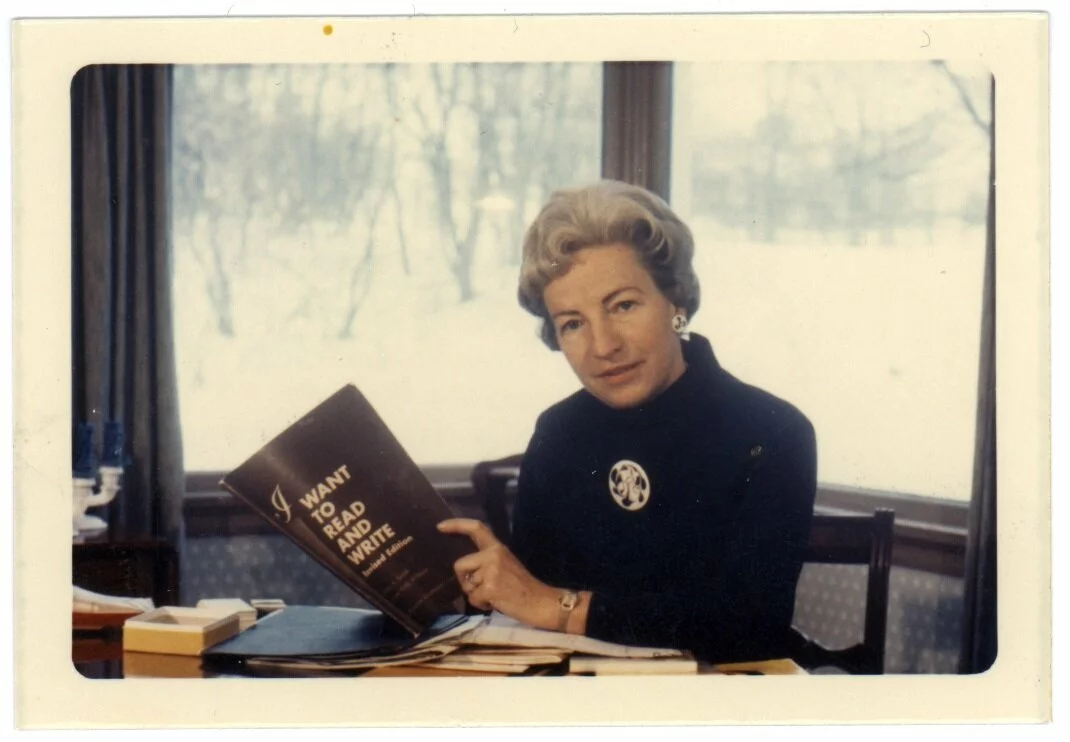Ruth Johnson Colvin deeply believed that age is just a number. “It’s what you do with your number that counts,” she would say.
She never believed age was a reason not to do something. Ruth was already in her late 40s before she started on the path to improve literacy rates for adults in her community. To her surprise, that path would lead her through six decades in which she traveled the world over, made acquaintances with dignitaries, embraced people of other cultures, and received honors from multiple US presidents. She did all this while most people her age were settling into retirement.
Ruth passed away August 18, 2024, at 107.
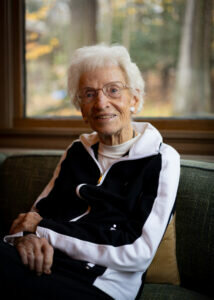 In her life she took nothing for granted. She had a deep respect for people and believed everyone, regardless of age, sex, race, or religion, should have a chance to live a good life. Her passion became helping people achieve this through literacy. We owe not only ProLiteracy’s existence to Ruth and her founding of Literacy Volunteers of America, but we are guided by her innate understanding that literacy is a right. We are humbled to have been able to learn from her for so long. Ruth willingly shared her wisdom with ProLiteracy staff, always encouraging us to continue our fight to improve adult literacy.
In her life she took nothing for granted. She had a deep respect for people and believed everyone, regardless of age, sex, race, or religion, should have a chance to live a good life. Her passion became helping people achieve this through literacy. We owe not only ProLiteracy’s existence to Ruth and her founding of Literacy Volunteers of America, but we are guided by her innate understanding that literacy is a right. We are humbled to have been able to learn from her for so long. Ruth willingly shared her wisdom with ProLiteracy staff, always encouraging us to continue our fight to improve adult literacy.
Ruth was a lifelong learner. From an early age, she stood up for gender equality so she could enjoy the same educational opportunities as her brothers and male counterparts. She married Bob Colvin in 1940, and together they had Terry and Lindy, in whom she instilled her beliefs of equality, acceptance, and learning. She encouraged them and anyone she encountered to always keep learning. This is what drove her into the literacy movement.
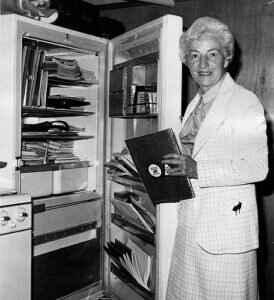 In 1961, when she learned that over 11,000 adults in her own community of Syracuse, NY, were functionally illiterate, she felt an urgency to know more. In her memoir, My Travels Through Life, Love, and Literacy, Ruth describes wondering how this was possible—we weren’t living in a poor country, after all. She was shocked. Who were these people? Why couldn’t they read? What was being done about it?
In 1961, when she learned that over 11,000 adults in her own community of Syracuse, NY, were functionally illiterate, she felt an urgency to know more. In her memoir, My Travels Through Life, Love, and Literacy, Ruth describes wondering how this was possible—we weren’t living in a poor country, after all. She was shocked. Who were these people? Why couldn’t they read? What was being done about it?
What Ruth did about it was nothing short of amazing.
She set out to find answers, and, with humility, made it her mission to give low-literate adults a newfound sense of self-worth by teaching them to read. She immersed herself in the world of literacy, and when no one else would, she found a way to organize an adult literacy movement from her basement using an old broken refrigerator to store her learning library.
She learned how to empower adults and teach them to read using topics that interested them. She learned how to find their strengths and weaknesses. She’d often find commonalities with the students she was teaching, whether it be stories about raising kids, holiday traditions, or taste in music. But she also learned from their differences. Ruth and her students broke down walls and built understanding and friendships.
I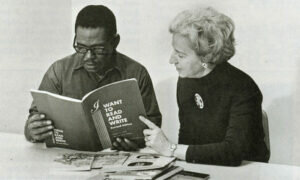 n her memoir, Ruth wrote about this. “It’s been said that you must be close to something to really understand it. That’s true, and I realized I really didn’t understand the plight of non-readers until I taught my first student. … Tutoring a student of a different race, education, and culture, varying economic and religious backgrounds, opened my mind in a personal way. … It opened the doors to new understandings and allowed me to focus on the things we had in common.”
n her memoir, Ruth wrote about this. “It’s been said that you must be close to something to really understand it. That’s true, and I realized I really didn’t understand the plight of non-readers until I taught my first student. … Tutoring a student of a different race, education, and culture, varying economic and religious backgrounds, opened my mind in a personal way. … It opened the doors to new understandings and allowed me to focus on the things we had in common.”
With that, she created a teaching model that others could use to teach adults in their own communities to read, and Literacy Volunteers of Greater Syracuse was born in 1962. Within 10 years, it had become Literacy Volunteers of America, with affiliates in cities nationwide.
Her dedication gained the attention of President Ronald Reagan, who invited her to the White House to award her the President’s Volunteer Action Award. Ruth would recall how she was sure the phone call she received about the award must have been a mistake. Her? The White House?
She was wrong; they wanted her.
It was hardly the last time she’d hear from the White House. Through her work in literacy, a close friendship blossomed between Ruth and former First Lady Barbara Bush, a fellow literacy activist. They would often exchange friendly correspondences about their advocacy or how nice it was to run into each other at some event. Later, Barbara’s son President George W. Bush would award Ruth the Presidential Medal of Freedom.
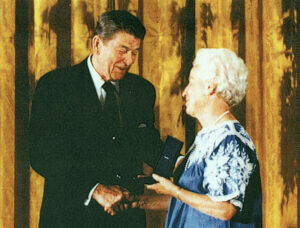 In 2002, Literacy Volunteers of America merged with Laubach Literacy International to become ProLiteracy, the largest nonprofit adult literacy organization in the country.
In 2002, Literacy Volunteers of America merged with Laubach Literacy International to become ProLiteracy, the largest nonprofit adult literacy organization in the country.
Ruth never dreamed she’d ever receive any kind of recognition for simply doing what she thought needed to be done. In cardboard boxes she saved all those official invitations from the White House and annual Christmas cards from the Bushes. But in those same boxes she also kept the hundreds of letters she’d received over the years from everyday tutors, students, and supporters. They wrote to ask her a practical teaching question, to share a story, or to simply tell her how much she inspired them. Those letters represented her life’s work and proved that anyone can make a difference in the lives of others.
Even her—a woman in Syracuse, NY, who decided to learn more.
So yes, Ruth had a big number. And what she did with it touched millions.
Thank you, Ruth.
A fund has been set up in Ruth’s honor to continue her work of creating a more just world through literacy. If you would like to give in Ruth’s memory, please visit https://proliteracylegacy.funraise.org/
